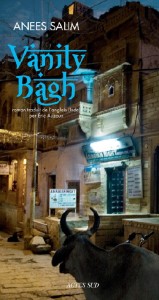A ‘Bagful’ of Tear-Wiping Humor
WRY HUMOUR. In one word or two, that’s what Anees Salim’s VANITY BAGH is. The tongue-in-cheek humour permeates every sentence and every word of the book.
The book is in the form of a narrative or rather monologue by Imran Jabbari, an accused in the 11/11 serial blasts and sentenced for sixteen years in prison, for a crime he, along with his gang of “ 5 1/2 “ , is an unknowing and inadvertent accomplice. Living in Vanity Bagh, a small-time Muslim majority mohalla, dubbed by sensation mongering press as ‘Little Pakistan’, opposite a nearby Hindu majority locality Mehandi, Imran Jabbari is a son of the Imam of the Masjid-e-Mosavi and he never refers to the latter in the narrative as his father but uses only the impersonal epithet ‘imam’.
“Vanity Bagh?” a jail warden, making entries in the admission register of the new inmate, asked Imran as he mentioned his locality. “You mean ‘bag’?” “No, not ‘bag’”. “ ‘Bagh’ he “doodles the letters in the air” as he uttered them, “suddenly concerned about having wrong spellings on a page which would probably not be referred to for the next sixteen years.”
The mohalla, so to say, is a ghetto with the imam and Abu Hathim Sahib, a make-believe dada, at its centre stage; with scattered poor families and with only one Christian home of Mr. Jospeh Pinto. The children of the locality are all drop-outs at various stages of schooling, since none is interested in education. There was also a Madrasa, but the highest learning they could acquire from there was simply the ability to read the alphabets from the Quran.
Most of the children are named after heroes in the politics and cricket of Pakistan. That was but natural, with new-fangled fancy Muslim names for kids replacing the archaic old ones of elders. “In our mohalla, it’s quite normal, you can even call it inevitable, to be named after someone rich and famous from Pakistan……, some of singers, some of actors,….cricketers. I, for instance, am named after Imran, the cricketer, and not Imran, the politician.” Thus there were Yahya, Zia, Benazir, Zulfikar, Nawaz Sharif. And Vanity Bagh and Mehandi had, between them, skirmishes and poster-wars in their games of communal one-upmanship.
One of the six children, Yahya was a congenital mute. Hence a group six youths, eager for small-time adventure, formed a gang of their own, a sort of dadagiri, named “5 1/2 “, in derision of Yahya’s disability. The first task that came their way was snatching of a second-hand Toyota car whose buyer had defaulted on payment of installment. Successful at that, they bade their time, for a while. Their second feat that came, without any knowledge of the actual nature of the job, at the bidding of a stranger, was to their undoing: parking of a few scooters in different places. They were told that the scooters had gold contraband in them and would be collected by other persons who would come later stealthily to take the scooters from the parking lots. The instructions they had was simply to leave the scooters at the parking spaces and quit immediately and get their money later. This, however, was what they would ultimately land up in jail for, since there were detonations in different localities and the arms of the law would ultimately overtake them; that is those of them who survived.
The author cannot be compared to P.G. Wodehouse who doubles you up and splits you into guffaws of loud laughter, nor even like Veloor Krishnan Kutty in Malayalam, who, nevertheless, makes your jaws asunder and agape with real laughter. Salim leaves the reader with a smile on his lips through and through. And smilingly is his unwritten message – serious though – conveyed between the lines: that the socio-cultural and economic causes behind the acts of the so-called terrorism are to be addressed to be effective as deterrent and not its outward later manifestations only. The hero-cum-narrator of the story, Imran Jabbari is uniformly resigned to whatever happens to him and his family and his mohalla. His narrative shows him to be totally unconcerned; a sort of clinical detachment is discernible in him throughout. It is evident in the way he thinks of and plots for a jail break, only to finally give it up, as it might embroil his younger brother Wasim and affect his chance of a cardiac surgery for his ailment. But he has to witness his co-prisoner and gang member Zia executing it; which ends up his being taken out of the prison just to identify Zia’s dead body, probably murdered. Using this characteristic dark humor, he describes his Ammi (mother) and Imam (father) and all other persons and situations.
Anees Salim, a new comer to writing, fiction or otherwise, won The Hindu Literary Prize for fiction in 2013 for Vanity Bagh. He does not prefer to hog the limelight but would rather remain unsung. One thing must be admitted though: some of his catchy phrases and truisms unmask his profession. He works with an advertising company and lives in Kochi. Advertising professionals by their very nature are all ears and sparing and stingy in talks; and what they do talk are short and pithy.























Connect
Connect with us on the following social media platforms.